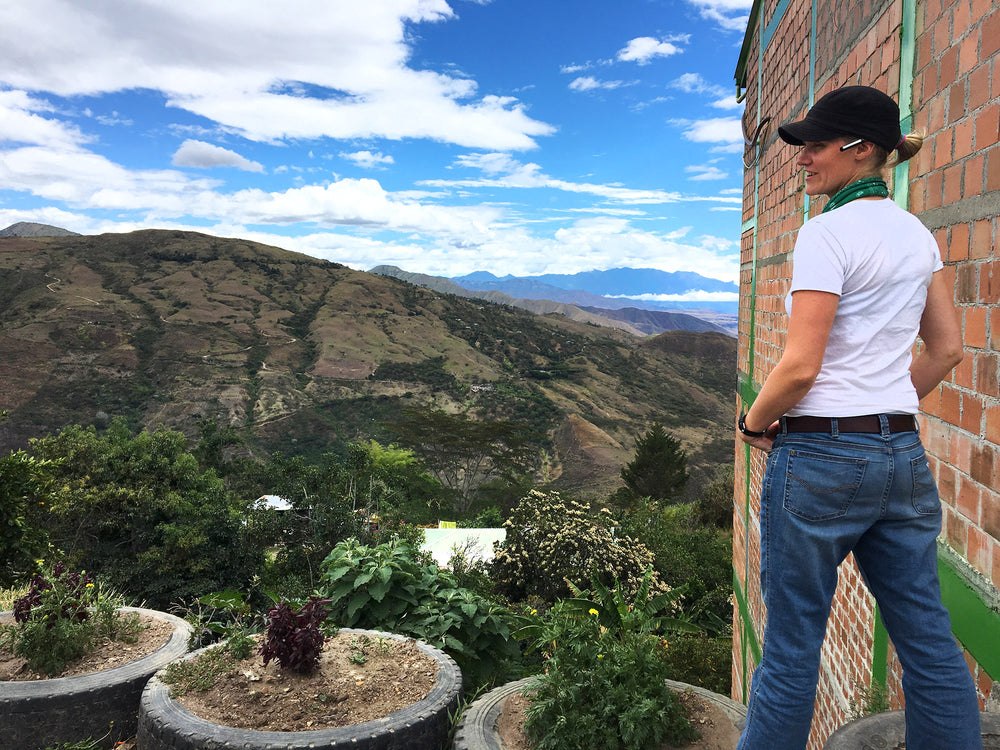
I recently spent a week in the Nariño region of Colombia, specifically the town of Buesaco in the Juanambu Canyon, and the coffee farms that line the mountainsides leading east toward the volcano Galeras. This region is famous worldwide for coffee, appropriately so.
I traveled with a group of spectacular coffee professionals from across the U.S. and had the opportunity to cup, or taste, 60 yields from various local farms. The coffees surpassed their reputation, and I was a happy little sponge soaking up as much of the industry’s intricacies as I possibly could. Suffice it to say, I’m saturated, and bursting with excitement to bring it home to you, our customers, who are the final piece in this crazy, global coffee chain.
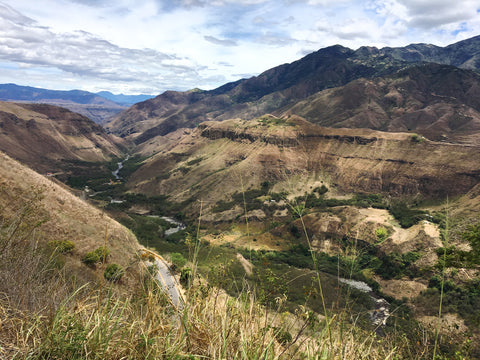
Juanambu Canyon
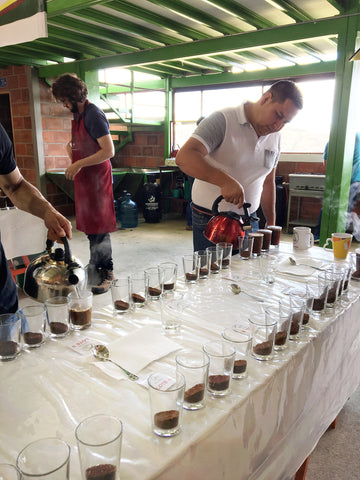
Each morning began with coffee cupping.
Three of my days were spent traveling some wildly winding dirt roads, along cliff sides and up grades so steep that the only thing visible in the windshield of our burly Toyota pickup truck was... the sky.
Each day brought different farms, each one a collection of juicy looking green coffee trees, lined in rows on impossibly steep terrain. In order to harvest the crop from these plants, pickers have to navigate dusty, sandy, slippery soil while judiciously choosing only the ripe cherries and collecting them in cumbersome baskets. It's tedious, physically demanding, dangerous work.
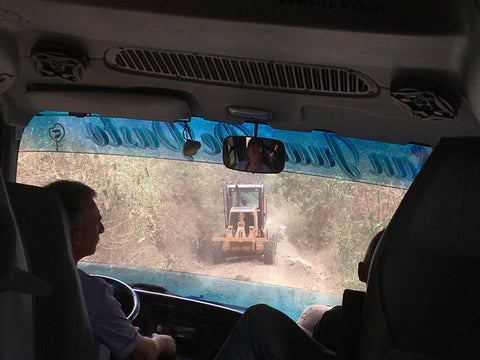
Sometimes our view was the back of a slow moving tractor, clearing the way for us.
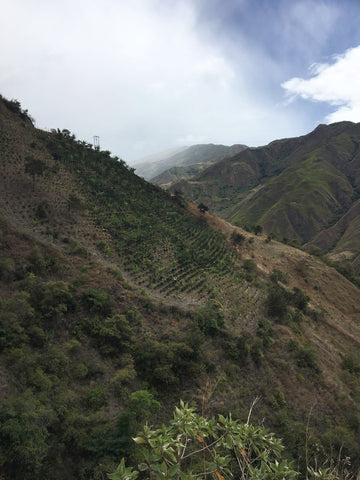
Coffee trees growing cliff side.
Every farmer I’ve ever met possesses the same quality of groundedness, of humility and connection to the earth which pours from their hands into everything they touch. The farmers here are like that. I’m overwhelmed by the task of describing their work ethic, their fortitude and resiliency, especially in a place like the southwest Andes of Colombia, where they’ve had so much to contend with in order to produce their crop.
Up until 10 years ago, the farmers here were forced to grow poppy plants and were controlled by armed guerrilla groups. With little security or law enforcement, it took years and a combined government and local effort to push the guerrilla forces out and make the switch back to growing coffee.

A farmer and his son.

Coffee cherries growing happily!
Cultivating coffee, as opposed to poppy plants is a lot more difficult in almost every aspect, but now these families feel safe and good about their livelihoods - it’s an entirely different way of being for them. One farmer invited all of the surrounding farmers to come to his home and meet us, as we were the first foreigners to visit his farm, and described what it had been like for them. It was amazing to learn about and to help give some recognition to their tremendous work.

Depulping the beans - check out that broom rigged to free any stuck beans. :)

Coffee dries on a rooftop.

The majority of the coffees I encountered were Honey Processed.
At each farm we visited, the family would feed all 12 of us lunch, which, in and of itself was a powerful experience - their hospitality and generosity was unparalleled.

A lovely woman who cooked us lunch and took on a tour of her family farm.

Trout!
In addition to meeting the farmers, building relationships and eating delicious food, we of course were there to taste the coffee! After each morning's session of tasting, we would sit and talk about the coffees and compare notes. At the end of the intense 3 days of tasting, we all decided as a group on our top 10. Even though everyone has their own personal taste, there are universal qualities that stand out, that most people would agree makes a good coffee. So it wasn’t too hard for us all to decide on those top 10.

Hmmmm, which coffee shall I choose?

The Award Ceremony guests.
Unbeknownst to us, an Award Ceremony was planned for the final day of our trip. All of the growers whose coffees we had tasted came to this big event to watch us taste our top 10 selections. The farmers whose coffees we liked the most received awards! This was a surprising and humbling experience, to say the least.
There were a couple moments when I felt quite emotional thinking about these families' livelihoods and how hard they work to hone their skills and crops. The stock and the power that was placed in my opinion about those crops was hard for me to accept. I was finally able to reconcile that idea by realizing how honored I am to be able to help give recognition to their hard work and to give appreciation to their amazing coffees.

Me in a tree.

This tiny indigenous woman came out to show us that she too is a coffee roaster - she roasts her coffee in this bowl over her fire!
One of the most impactful things I brought home with me is the understanding of what it truly takes to grow coffee - every step of the process is intense and difficult. This lifestyle and terrain shows in the people - their toughness, groundedness and realness is evident. Nothing comes easily for these folks.
Also, all of the farmers here are very much connected - there’s a collective alliance where they pool their resources together and take care of each other.
This trip was a game changer for me, personally and professionally, to be able to experience first hand, how connected we all really are.

In the end, I selected 4 coffees that I loved. We'll soon be sampling them here at the Homestead, together, and will be more than honored to share the best of the best with you.
In gratitude,
Katie


Comments
Shy Low
What an interesting insight and wonderful experience for Katie, thanks for sharing. Im sure it was a humbling experience to see the poor proud farmers harvesting their wares.
Thanks to them we are able to hopefully be more appreciative of this liquid gold called coffee. Will be by the shop on my next jaunt down the towpath!
Cheers
Shylow
April 10, 2020
Anne Kaminski
What an incredible experience this must have been. Thanks for showing me the origins of my favorite drink.
September 14, 2018
Scott Deter
Well written Katie!! I hope you didn’t crush any farmer’s dreams! Lewis family give Katie a damn raise!!
September 14, 2018
Linda Abbaszadeh
Thanks for sharing your travels with us. We sometimes forget how far our coffee has travelled and the labor of love that went into the process. Next time I sip my morning coffee, I will say a little thank you to those beautiful farmers and their families.
September 14, 2018
Camille
Thank you for sharing your experiences on this trip. Can’t wait to sample the new coffees
September 14, 2018
Leave a comment
Also in News
Why We Work Exclusively With Small Farms
April 24, 2024
Continue reading
Exploring a Transforming Colombia - Comuna 13 in Medellín
April 07, 2023 2 Comments
Continue reading
2020 Thoughts and Gratitude
September 18, 2020 4 Comments
Continue reading